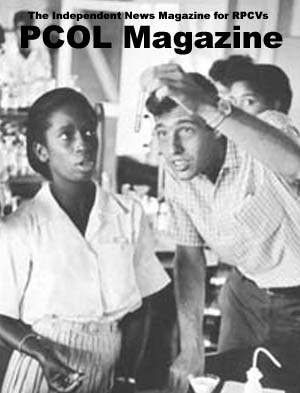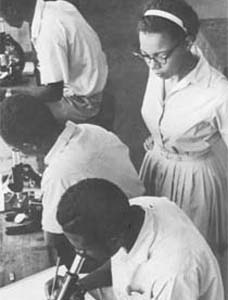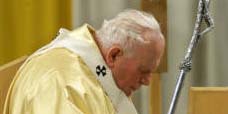
"I applied in December and still don't exactly know where I'll be going, when I'll be leaving, or what I'll be doing. But if you go into this knowing that the Peace Corps is a bureaucracy and these things take time, you get accustomed to the process and eventually accept what you signed up for," said one Peace Corps applicant.
Peace Corps draws eager recruits
Students share college ideal of “common good” with communities worldwide
April 22, 2005
By Elly Pepper
Staff Writer
"I just can't see myself working in an office straight out of college," said Charlie Moyer '05. Driven by this realization, Moyer applied for the Peace Corps this fall and has since been nominated for service in Central Asia to begin following his graduation. This decision is not uncommon among impending graduates, especially for those from liberal arts institutions. With the difficulty of obtaining jobs and the often daunting prospect of office work, students have increasingly viewed the Peace Corps as a both interesting and valuable career choice.
The Peace Corps started in 1960 when then Senator John F. Kennedy challenged students at the University of Michigan to serve their country and promote peace by living and working in developing countries. Kennedy's inspiring message not only increased interest in international work, but also spurred the development of a federal government agency dedicated to such a task. Since the Peace Corps's creation, 178,000 volunteers have been invited by 138 countries to work on a range of issues in the areas of business development, agriculture, information technology, AIDS education, and environmental awareness. Many of these volunteers are recent college graduates. This year, Bowdoin is one of the top five colleges (in the less than 2,500 category) with the most Peace Corps volunteers and currently boasts fifteen alumni involved in the program.
Past Bowdoin alums have been involved in a range of activities while working abroad. Heather Evans '94 helped a Haitian community establish a credit program for local peasants and instructed teachers on how to use a computer. Justin Sandver '02 taught grades six to 10 and led school sports teams and clubs in the western Ukraine. While their experiences were vastly different, they both agreed that personal growth and a change in perspective were two major benefits of the experience.
"I would not change my decision to go to Haiti," said Evans.
"I met the most wonderful people and learned a ton about myself, my values, and how I wanted to lead my life," she said.
The Peace Corps also offers career benefits such as preferential hiring for government jobs in the year following one's service and some assistance in paying student loans. In addition, upon completion of the two years, each volunteer is awarded with a $6,000 stipend. Certain career paths require field experience and look very positively on the Peace Corps service when hiring employees.
"I want to get into socially responsible development and field experience is necessary to gain credibility in this field," said Lindsay McCombs '05, who has been nominated for a program in Latin America.
"Everyone I talk to says the Peace Corps is gold. Coming out of it, it says things about you. It says you're very strong and determined, regardless of the type of work it is. People are basically in awe," she said.
However, the two-year commitment is also extremely challenging. Initially, Evans, who left her post-graduation banking job in New York to join the Peace Corps, had a difficult time adjusting to the slow pace of life.
"This has been difficult coming from New York City where 'on time' dictates that you arrive 10 minutes prior to the time agreed," she said. Evans described her lifestyle in Haiti as "simplistic," which included reading by kerosene lamp, bathing with a bucket outside, cooking on a single burner propane stove, using an outhouse, boiling water to drink, washing clothes by hand, and walking one and a half hours to the nearest phone. Sandver also expressed frustrations at his experience, but for a different reason.
"Though it is impossible, I would encourage all volunteers to imagine all of the personal benefits they hope to gain, all of the cultural insights they would gain, the language skills, but consider also [the possibility] of making no difference in their [assigned] community, and then still ask if they want to volunteer," said Sandver.
Most volunteers agree that while the experience can be personally fulfilling, it should not be approached with grandiose plans that cannot, in reality, be implemented.
Because of the challenges of working for the Peace Corps, candidates must undergo a vigorous application process, beginning with a written submission. Candidates are then interviewed by a recruiter, who matches the applicant's skills with a suitable program, such as environmental education or AIDS awareness, and nominates the candidate for that specific position. Next, candidates complete extremely tedious legal and medical forms. Finally, the agency's placement office reviews all of the information, and determines the candidate's placement based on their qualifications.
The placement office also assigns the volunteer to a specific country and a departure date, but the name of the exact location remains undisclosed. Upon departure, volunteers undergo a three-month training program. Upon completion, they settle in their assigned community.
If the process sounds uncertain, that's because it is. "I applied in December and still don't exactly know where I'll be going, when I'll be leaving, or what I'll be doing. But if you go into this knowing that the Peace Corps is a bureaucracy and these things take time, you get accustomed to the process and eventually accept what you signed up for," said Moyer. But perhaps a degree of uncertainty is part of the allure, as suggested by McCombs. "This is sort of a time in my life to take risks...whatever I do is going to be a risk—so I'm OK in not knowing everything," McCombs said. "It's part of the fun of it."










